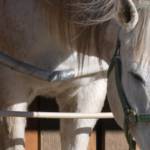Macromineral Considerations for Horses Recovering from Injuries

Calcium, phosphorus, and magnesium are critical minerals involved in bone health, and it is logical that repair of bone damage suffered by performance horses will be delayed if there are insufficient quantities of these minerals in the diet. Calcium is also involved in collagen-forming enzymatic activities. The horse uses skeletal calcium stores as a source of calcium to maintain blood and tissue levels when the diet doesn’t supply adequate quantities.
Because alfalfa (lucerne) has such high amounts of calcium, deficiencies are relatively rare if alfalfa hay is used. Most premixed feeds contain higher than necessary quantities of calcium and many supplements contain calcium. Alternatively, ground limestone can be fed as a source of calcium or dicalcium phosphate as a source of calcium and phosphorus. Grains and grain by-products, particularly bran and pollard, are low in calcium and high in phosphorus. Both calcium and phosphorus needs must be met with a calcium-to-phosphorus ratio in the total diet between 1.1:1 and 3:1.
Magnesium is an important constituent of bone and is also an enzyme cofactor involved in cellular energy metabolism. Most feed programs contain enough magnesium in natural feeds so its supplementation specifically would be unnecessary, but it is possible that some horses do not digest magnesium efficiently enough or have increased losses.
Sodium, potassium, and chloride are the key minerals involved in maintenance of tissue osmotic pressure and acid-base balance, control of water balance, and passage of nutrients into cells. Sodium is also involved in glucose uptake in the small intestine, and this has a powerful influence on energy balance. Sodium and chloride deficiencies have a negative impact on water balance and hydration status. Extreme cases of deficiency lead to alterations in blood flow that may be detrimental to the healing process.
All horses need added salt in their diets as most feedstuffs do not contain sufficient sodium and chloride. Exercising horses have additional requirements for these minerals to replace losses in sweat, and hot weather or pain will also increase losses due to sweat. For this reason, it is a good practice to offer free-choice salt in the form of block or rock salt to all horses. Hay and salt consumption encourages horses to drink, which in turn prevents dehydration.
If a horse is receiving adequate quantities of roughage such as hay, chaff, or pasture, a potassium deficiency is unlikely. However, many performance horses are fed so much grain and so little roughage that they need added potassium. Potassium deficiencies can lead to dehydration and influence water intake. Horses cannot conserve potassium for any period of time, and if a horse is off feed due to pain after an injury, potassium depletion can occur rapidly. Most commercial electrolytes contain potassium, although it is present in variable quantities, and some injured horses that are not eating may benefit from an electrolyte supplement. Once the horse starts eating hay in sufficient quantities potassium needs are likely to be met.








